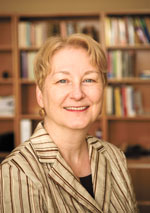
12 faculty members transfer to emeritus status
by Jennifer Greenstein Altmann
Twelve faculty members were transferred to emeritus status in recent action by the Board of Trustees.
They are: Marguerite Browning, associate professor of linguistics in the Council of the Humanities; Stanley Corngold, professor of German and comparative literature; Robert Ebert, professor of German; Walter Hinderer, professor of German; Peter Jeffery, the Scheide Professor of Music History and a professor of music; Austin Newton, professor of molecular biology; Robert Pascal Jr., professor of chemistry; Michael Rothschild, the William Stuart Tod Professor of Economics and Public Affairs; Stuart Schwartz, professor of electrical engineering; James Seawright, professor of visual arts in the Lewis Center for the Arts; T. Leslie Shear Jr., professor of classical archaeology; and Yoshiaki Shimizu, the Marquand Professor of Art and Archaeology.
All are effective July 1, 2009, except for the transfers of Ebert, Newton, Rothschild and Schwartz, which are effective Sept. 1, 2009, and Pascal’s, which was effective April 1, 2009.

Browning had an improbable journey to an academic career. The daughter of a circus drummer, she dropped out of Denison University to join an experimental theater group in Boston. She did not return to college until her late 20s, when she enrolled at the University of Massachusetts, where she later earned her bachelor’s degree. She had hoped to study American Sign Language for a career working with deaf people, but when it wasn’t offered she took a class in the closest subject she could find, which was linguistics. After receiving her Ph.D. in 1987 from the Massachusetts Institute of Technology, she taught at MIT and the University of Texas-Austin before arriving at Princeton in 1990.
A theoretical linguist, Browning has focused on theories of syntactic movement, the rules that govern how the underlying structure of a sentence can be transformed. Her research has appeared as a monograph, “Null Operator Constructions,” and in articles published in the field’s most prominent journal, Linguistic Inquiry, as well as in many other journals and edited collections. Recently she has worked on the history of linguistics.
Browning served as director of the Program in Linguistics from 1997 to 2001 and as master of Wilson College since 2004. She will become the vice president for student life and dean of students at Harvey Mudd College.
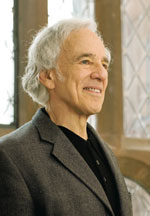
Corngold has spent his entire academic career at Princeton, joining the faculty in 1966. After earning his bachelor’s degree from Columbia University, he studied Sanskrit at the University of London and taught English at the European division of the University of Maryland before earning his Ph.D. at Cornell University.
He is best known as an authority on the writer Franz Kafka. His 1973 article “Metamorphosis of the Metaphor” changed the understanding of the textual character of Kafka’s work. Over the next 30 years, Corngold went on to produce a Kafka trilogy: “The Commentators’ Despair,” “Franz Kafka: The Necessity of Form” and “Lambent Traces: Franz Kafka.”
One of his most influential works is “The Fate of the Self: German Writers and French Theory,” a study of German literature and philosophy between 1800 and 1950 in which he presents a compelling case for considering German writers and modern French theory together. He also has written more than 100 essays examining the work of French and German philosophers and authors. This year he was awarded Princeton’s Behrman Award for distinguished achievement in the humanities.
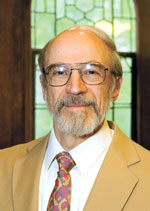
Ebert earned his bachelor’s degree from Union College and received his Ph.D. from the University of Wisconsin-Madison after attending the University of Erlangen in Nuremberg, Germany, as a Fulbright Fellow. He taught at the University of Chicago for six years and the University of California-Berkeley for one before arriving at Princeton in 1979.
The author of five books and dozens of articles, Ebert is a leading scholar of Germanic linguistics. He wrote two widely used volumes on the historical syntax of the German language in the period 1300 to 1750. He co-wrote the first comprehensive grammar of the language in the late medieval and early modern periods, “The Frühneuhochdeutsche Grammatik.”
Ebert served as director of the Program in Linguistics from 1979 to 1985. As chair of the Department of German from 1989 to 1999, he oversaw the evolution of the department as it broadened to include the study of film, painting, photography, new media and philosophy.
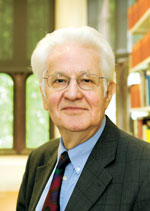
Hinderer has been one of the most prolific and wide-ranging scholars in the field of German literature and culture over the past 40 years. The author of seven books, 35 edited volumes, more than 150 scholarly articles and numerous reviews, essays and articles for major publications, he has expertise on a wide range of authors from the 18th, 19th and 20th centuries. He also has been a fellow at the Institute for Research in the Humanities at the University of Wisconsin, the Institute for Advanced Study in Berlin and the Rosenzweig Research Center for German-Jewish Literature and Cultural History at Hebrew University in Jerusalem.
Hinderer, who received his Ph.D. from the University of Munich, arrived at Princeton in 1978 after teaching at several U.S. institutions. He has received many awards, including the Order of Merit of the Federal Republic of Germany, the Alexander von Humboldt Prize for internationally renowned scholarship and the Austrian Cross of Honor for Science and the Arts.
Hinderer is a trustee of the American Institute for Contemporary German Studies in Washington, D.C., the Kurt Weill Foundation for Music in New York, the Foundation for Research in Romanticism in Munich and the Erich Fried Society of Language and Literature in Vienna.
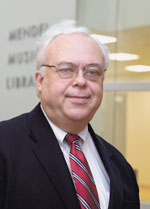
Jeffery, a scholar of medieval musicology, earned his bachelor’s degree from Brooklyn College and his Ph.D. from Princeton in 1980. He taught at the University of Delaware for nine years before arriving at Princeton in 1993.
An expert on chant scholarship, Jeffery wrote a series of landmark articles on the history of Christian chant during the first millennium. In his 1992 monograph “Re-Envisioning Past Musical Cultures: Ethnomusicology in the Study of Gregorian Chant,” he explored the manifold ways in which chant scholarship can benefit from methods and insights developed in the study of non-Western and noncanonical musical cultures. His recent monograph “The Secret Gospel of Mark Unveiled: Imagined Rituals of Sex, Death and Madness in a Biblical Forgery,” unraveled the forgery of a letter attributed to St. Clement of Alexandria.
Jeffery has received wide recognition for his contributions to musical scholarship, including a MacArthur Fellowship in 1987. In July, he will join the faculty of the University of Notre Dame.
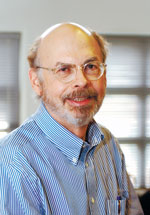
Newton, who has taught at Prince-ton for 43 years, is an expert in developmental biology. He earned his bachelor’s degree from the University of Texas-Austin and his Ph.D. from the University of California-Berkeley. Before coming to Princeton, he spent two years as a postdoctoral fellow at the Pasteur Institute in Paris in the laboratory of Nobel Prize recipient Jacques Monod.
Newton’s research has focused on the tiny freshwater bacterium Caulobacter, which produces distinctive asymmetric daughter cells upon division. His work developed Caulobacter as a model organism for the study of asymmetric cell division and differentiation in animal and plant cells. With collaborators at Princeton, he initiated a systematic genetic and molecular analysis of the origins of these asymmetries. This work has led to many new insights into cell polarity, cell cycle organization and regulation and, especially, how cells switch from one morphology to another during differentiation. More than 100 peer-reviewed articles on this and related topics have been published from his laboratory.
Newton’s research has been supported by grants from the National Institutes of Health, the National Science Foundation and the American Cancer Society. He was director of graduate studies in the Department of Biology from 1977 to 1984, when he joined the newly formed Department of Molecular Biology. In that department, he organized the graduate program and served as director until 1989. He has been on the editorial board of the Journal of Bacteriology and was associate editor of Developmental Genetics. In 1998, he was elected a fellow in the American Academy of Microbiology.
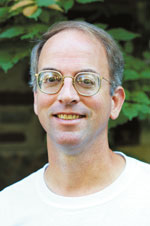
Pascal received his bachelor’s degree from Louisiana State University and his Ph.D. from Rice University. After two years at the Massachusetts Institute of Technology as a postdoctoral fellow, he joined the chemistry faculty at Princeton in 1982.
Pascal’s research interests have been unusually broad during his career. His early research focused on enzymatic oxygen and methyl transfer reactions, with the goals of elucidating their chemical mechanisms and designing inhibitors of these enzymes for use as antimicrobial agents. More recently he has moved from biochemistry to the organic chemistry of “unnatural” products. This includes the synthesis and structural characterization of highly strained aromatic compounds having unprecedented geometry and unusual reactivity, the design of new materials by “crystal engineering” and computational studies of the structures and conformational dynamics of complex aromatic molecules.
Pascal retired to accept the Bernard Villars Baus Chair in Chemistry at Tulane University.
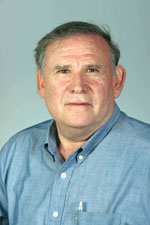
Rothschild is an expert on decision-making under uncertainty and the effects of imperfect and asymmetric information on economic outcomes. He earned his bachelor’s degree from Reed College, his master’s degree from Yale University and his Ph.D. from the Massachusetts Institute of Technology.
Rothschild first joined the Princeton faculty in 1972 but left in 1976 to teach at the University of Wisconsin. He later took a faculty position at the University of California-San Diego, where he served as the first dean of social sciences. He returned to Princeton in 1995 to serve as dean of the Woodrow Wilson School of Public and International Affairs. During his seven-year tenure, the school established the one-year master in public policy program for mid-career professionals; the Program in Law and Public Affairs; the Center for the Study of Democratic Politics; the Center for Health and Well-being; the Bendheim-Thoman Center for Research on Child Well-Being; the Educational Research Section; and the Center for Arts and Cultural Policy Studies.
In the early 1970s, Rothschild published a string of groundbreaking papers on decision-making under uncertainty and asymmetric information. Several were joint works with Joseph Stiglitz, who won the Nobel Prize in 2001. One of the landmarks in the field of information economics is their paper on insurance markets, which demonstrates the difficulties that competitive markets have in dealing well with asymmetric information. He also has written about higher education, taxation, investment, jury-decision processes and finance.
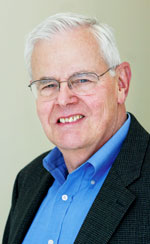
Schwartz has spent his entire academic career at Princeton, joining the faculty in 1966, the same year he earned his Ph.D. from the University of Michigan. He received his bachelor’s and master’s degrees from the Massachusetts Institute of Technology.
In his research, Schwartz has made advances in areas that are important to current computer networks and wireless communications. He has made contributions to statistical signal processing and communication theory, specifically in the areas of detection and estimation, channel equalization, and adaptive and wireless communications. He was one of the first researchers to derive an estimator-correlator structure for an important class of digital communication problems. He has worked on equalization of multi-user receivers in high-speed communication networks, adaptive and robust detection procedures, application of game theory to wireless networks and radio source location.
Schwartz served as associate dean of the School of Engineering and Applied Science from 1977 to 1980 and as chair of the electrical engineering department from 1985 to 1994.
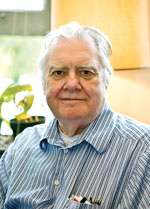
Seawright is a modernist sculptor whose works are in the permanent collections of museums throughout the world, including the Museum of Modern Art, the Guggenheim Museum, the Butler Institute of American Art, the Neuberger Museum of Art and the New Jersey State Museum. He has been on the Princeton faculty since 1967.
Seawright taught himself the fundamentals of sculpture while serving in the Navy as an operations and engineering lieutenant. He is known for creating interactive, kinetic sculptures that incorporate mirrors, wires and electronic components. Some of his early works generated audio effects as well as movement. He has created several large works for public spaces, including at airports in Seattle and Boston.
For three decades, he served as director of the Program in Visual Arts, overseeing the creation of the Stewart Film Theater at 185 Nassau St. and expanding the program to include digital photography as well as increased offerings in film and video. In 2004, he was honored with the Behrman Award. He received his bachelor’s degree from the University of Mississippi.
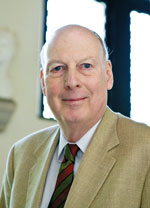
Shear received his bachelor’s degree and Ph.D. from Princeton in 1959 and 1966, respectively. After a brief stint teaching at Bryn Mawr College, he returned to Princeton to join the faculty in 1967.
In addition to his teaching at Prince-ton, he served for 26 years as field director of the American excavations in the Agora of Athens under the aegis of the American School of Classical Studies at Athens. During his tenure, the excavations yielded the discovery of a section of the famed Stoa Poikile, or the Painted Porch, built in the fifth century B.C. and painted by the greatest artists of the day. His dissertation, “Studies in the Early Projects of the Periklean Program,” is widely used by archaeologists and historians studying the complex history of the Athenian Acropolis.
Shear served as associate chair of the Department of Art and Archaeology from 1976 to 1978 and again from 1982 to 1983. He also was director of the Program in Classical Archaeology.
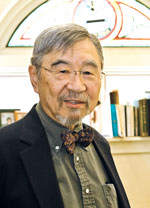
Shimizu, an expert in Japanese art history, received his bachelor’s degree from Harvard University and his Ph.D. from Princeton in 1975. He spent two years as a lecturer and assistant professor at Princeton before leaving for the University of California-Berkeley, where he was a faculty member for four years. He then spent five years as the curator of Japanese art at the Freer Gallery of Art in Washington, D.C. and taught for a semester at Princeton before rejoining the faculty full time in 1984.
Shimizu has published innovative essays on a wide range of topics, including narrative paintings by the Chan monk painter Yin Tuoluo, seasonal paintings and poetry in early Japan, workshop management of the Kano painting studio and Zen art. He also curated major museum exhibitions, most notably “Japan: The Shaping of Daimyo Culture 1185-1868,” shown at the National Gallery of Art in Washington, D.C., in 1988. It examined the dual ambitions of premodern Japanese warriors to excel at both the arts of war, as reflected in arms and armor, and the arts of peace, as represented by paintings, lacquer, calligraphy and other visual arts that the warriors either commissioned or produced themselves.
Shimizu served as chair of the Department of Art and Archaeology from 1990 to 1992. To mark his retirement, a two-day symposium on Japanese art was held in April at the University, and the Princeton University Art Museum is hosting an exhibition titled “Memorable Encounters From Ho¯nen to de Kooning: In Honor of Yoshiaki Shimizu.”

